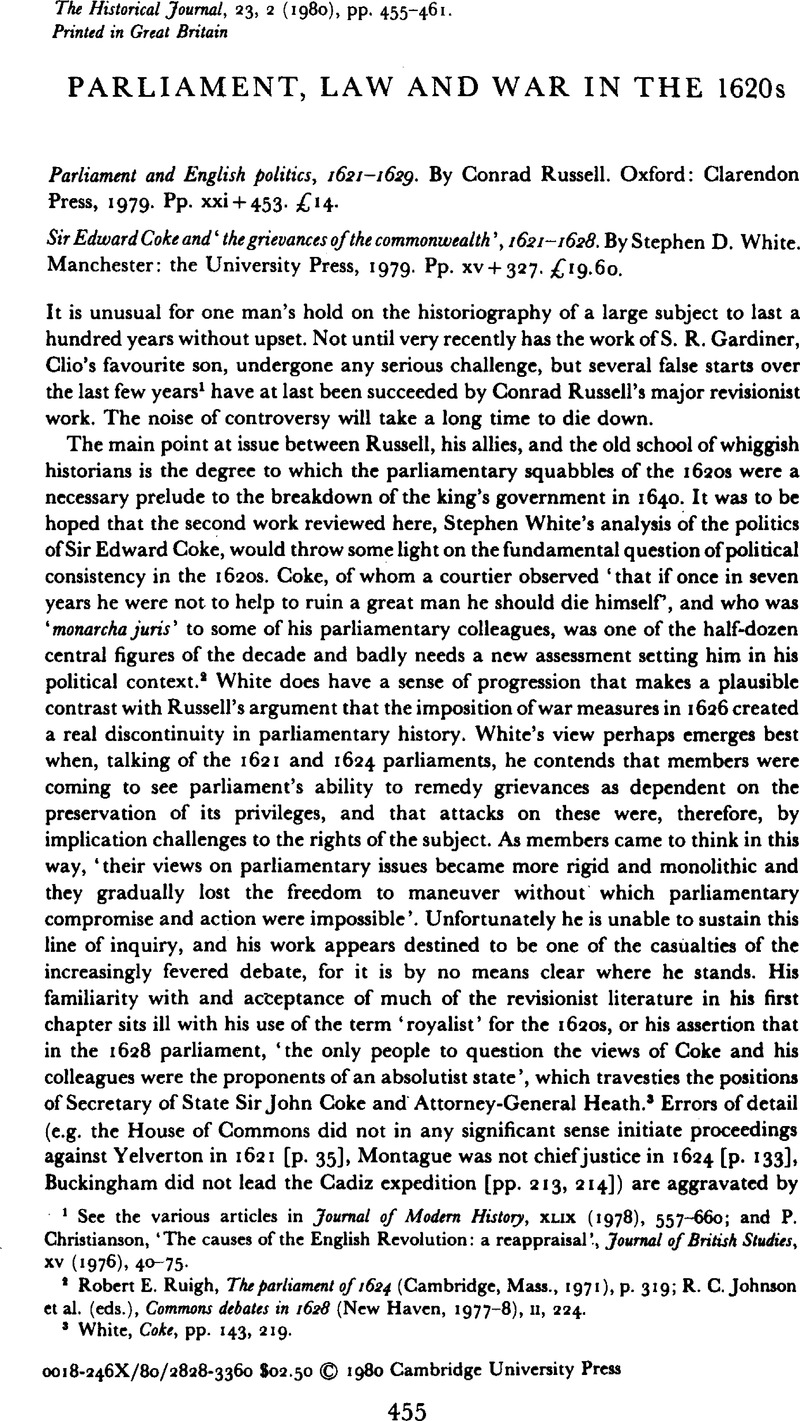Article contents
Parliament, Law and War in the 1620s
Published online by Cambridge University Press: 11 February 2009
Abstract

- Type
- Review Articles
- Information
- Copyright
- Copyright © Cambridge University Press 1980
References
1 See the various articles in Journal of Modern History, xlix (1978), 557–660Google Scholar; and Christianson, P., ‘The causes of the English Revolution: a reappraisal’., Journal of British Studies, xv (1976), 40–75.CrossRefGoogle Scholar
2 Ruigh, Robert E., The parliament of 1624 (Cambridge, Mass., 1971), p. 319Google Scholar; Johnson, R. C. et al. (eds.), Commons debates in 1628 (New Haven, 1977-8), ii, 224.Google Scholar
3 White, Coke, pp. 143, 219.
4 Ibid. pp. 192, 220, 76.
5 Russell, C., ‘Perspectives in parliamentary history, 1604–1629’, History, lxi (1976), 1–27.CrossRefGoogle Scholar
6 Russell, Parliaments, p. 64.
7 Ibid. pp. 103, 420.
8 Elton, G. R., ‘Tudor government. The points of contact: parliament’, Transactions of the Royal Historical Society, 5th ser. xxiv (1974), 183–200CrossRefGoogle Scholar; Mitchell, W. M., The rise of the revolutionary party in the English House of Commons 1603–1629 (New York, 1957).Google Scholar
9 Russell, Parliaments, p. 25. For an outstanding example of ideological sophistication in 1610, see the speech of Thomas Hedley on impositions: Foster, E. R. (ed.), Proceedings in parliament 1610 (New Haven, 1966), ii, 170–97.Google Scholar
10 Ibid, ii, 72, 354.
11 Russell, Parliaments, pp. 198–9; White, Coke, pp. 99–100.
12 Hexter, J. H., ‘Power struggle, parliament and liberty in early Stuart England’, J.M.H. i (1978), 39–40.Google Scholar
13 Scot, T., The highwaies of God and the King and The proiector (London, 1623)Google Scholar; Hirst, D., Representative of the people? (Cambridge, 1975), pp. 144–5, 164–5.CrossRefGoogle Scholar
14 Russell, Parliaments, p. 15; Commons debates in 1628, iv, 65.
15 Russell, Parliaments, p. 233.
16 See, for example, the articles by Christianson and Farnell in J.M.H. xlix (1978), 575–99, 641–60.
17 Historical Manuscripts Commission Report, Hastings MSS. iv (1947), 255–7, 262–3; Relf, F. H. (ed.), Notes of the debates in the House of Lords, 1621–1628 (Camden Soc., 1929), p. 130.Google Scholar
18 H.M.C. Report, duke of Buccleuch's MSS. in (1926), 340–1; Johnson, G. W. (ed.), Fairfax correspondence (London, 1848), I, 158Google Scholar. For the peers’ preoccupation with matters of honour see, for example, Snow, V. F., Essex the rebel (Lincoln, Neb. 1970), pp. 104–6, 180–1Google Scholar; and Sharpe, K., ‘The earl of Arundel, his circle and the opposition to the duke of Buckingham, 1618–28’, in Sharpe, K. (ed.), Faction and parliament (Oxford, 1978), pp. 209–44.Google Scholar
19 Russell, Parliaments, p. 14n.; Relf, Debates in the lords, p. 126.
20 Russell, Parliaments, p. 368.
21 Commons debates in 1628, III, 270; II, 65, and III, 27, 201, 203. Coke avowed even more ominously that he could not be restrained by any law made, ibid, III, 189.
22 Quoted in Russell, Parliaments, p. 368; Commons debates in 1628, III, 271.
23 Russell, Parliaments, p. 349; Commons debates in 1628, in, 272.
24 Although Russell does at one point concede that 1628 was closer to 1640 than it was to 1621, this is certainly not the thesis of the book. Russell, Parliaments, p. 420.
25 Russell, Parliaments, p. 427.
26 Barnes, T. G., Somerset 1625–1640 (Oxford, 1961), pp. 253–7, 271–8CrossRefGoogle Scholar; Fletcher, A., County community in peace and war (London, 1975), pp. 193–4, 201Google Scholar. It should be noted that both Barnes and Fletcher hold the central government as much at fault as the local authorities: see also Hirst, D., ’The privy council and problems of enforcement in the 1620s’, Journal of British Studies, xviii (1978), 44–66.Google Scholar
- 3
- Cited by




